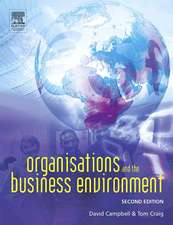Intelligence Communication in the Digital Era: Transforming Security, Defence and Business
Editat de R. Arcos, R. Phersonen Limba Engleză Hardback – 2 iun 2015
Preț: 826.58 lei
Preț vechi: 1008.02 lei
-18% Nou
158.16€ • 165.14$ • 130.90£
Carte tipărită la comandă
Livrare economică 04-18 aprilie
Specificații
ISBN-10: 1137523786
Pagini: 114
Ilustrații: XII, 114 p. 17 illus.
Dimensiuni: 140 x 216 x 11 mm
Greutate: 0.31 kg
Ediția:2015
Editura: Palgrave Macmillan UK
Colecția Palgrave Pivot
Locul publicării:London, United Kingdom
Cuprins
Introduction: The Changing Intelligence Communications Landscape 1. Communicating Analysis in a Digital Era 2. Presentational Tradecraft: A New Skill 3. Communicating Risk 4. Establishing a New Paradigm of Collaboration 5. Creating Impactful Intelligence: Communication Lessons From the Corporate Environment 6. Transforming Producer/Consumer Relations through Modeling and Computation
Recenzii
'Intelligence Communication in the Digital Era is essential to every strategy, marketing, finance, and intelligence professional who understands that professional career viability is dependent on the ability to navigate streams of information and associated decision delivery systems. The book tells how to convey critical recommendations and executive support in clear, concise, and creative ways; capture attention at the highest levels; and provide easy access to decision support criteria that give organizations a competitive advantage. Kudos to Arcos and Pherson for authoring a resource that provides application rather than theory to the overarching requirements placed on intelligence professionals in a world where information abounds.' Nanette Bulger
Executive Director and CEO, Strategic and Competitive Intelligence Professionals (SCIP)
'In an age of complexity, velocity, and high jeopardy, the challenge to exert effect has never been greater for an information exploitation specialist be it a business analyst, an insurance actuary, or an intelligence officer managing national security requirements ranging from defence to terrorism. Rethinking the fundamentals of assessment methodology, and particularly the conveyance of the message, will be the key to success for those in the analytical sphere. In a world where decision-makers are overwhelmed by data, increasingly secure in their own belief systems, and cynicism or distrust grow stronger with each alleged scandal, the analyst must become adept at understanding client needs and able to offer clear, well founded, and effectively marketed judgments. This is not about distorting or perverting the sanctity of the objective message; rather, it is acknowledging the impact of a fast-paced business environment as well as recognizing what is emerging as an increasingly prevalent and distortive cognitive bias that exists within all of us due to this Internet-enabled information age.' Ray Boisvert
Former Assistant Director, Intelligence, Canadian Security Intelligence Service
President/CEO, I-Sec Integrated Strategies ?
'Intelligence Communication in the Digital Era reminds us of two very important things: technological change is about delivering intelligence as well as gathering it; and change is as much an opportunity as a risk. Arcos and Pherson continue to lead the thinking in this area for academics and practitioners alike with this highly significant new contribution to the Intelligence Studies literature.' Dr Julian Richards, Co-Director, Centre for Security and Intelligence Studies (BUCSIS), University of Buckingham, UK
'Although the intelligence community is an information industry, in many ways its processes have changed little since the digital revolution. To avoid obsolescence, intelligence organizations will need to modernize by reforming information management, promoting asynchronous collaboration, and adopting a model of production not based on the 'document' paradigm. This book can guide that effort; it will be a valuable resource for intelligence practitioners and their managers in both industry and government.' Nick Hare, Former head of Futures and Analytical Methods, UK Defence Intelligence
'Technological advances are dramatically impacting what information is available to the community of policy and decision makers, where they get it from, when they want to view it, and how they make sense of it. These changes exacerbate half-century-old disconnects between intelligence providers and those they would serve, making it harder to overcome barriers imposed by outmoded technology and inadequate techniques for facilitating well-advised decisions. This book opens a valuable window on this world of challenges, starting with an astute introduction to the landscape by Pherson and Arcos, followed by six thoughtful chapters on significant issues in communications, collaboration, and producer/consumer relations. It is a compendium of excellent insights with lots of supporting references pointing to a new approach.' Robert Neches, Former Director of Incisive Analysis, Intelligence Advanced Research Projects Activity (IARPA), Office of the Director of National Intelligence, USA
Notă biografică
Jonathan Calof, Telfer School of Management, CanadaAaron B. Frank, RAND Corporation, USAMary O'Sullivan, Pherson Associates, USAJohn Pyrik, Justice Institute of British Columbia, Canada
Descriere
This edited volume argues that producers of analysis need to shift from producing static, narrative products to much more dynamic, digitally-based platforms in order to remain competitive and relevant.























